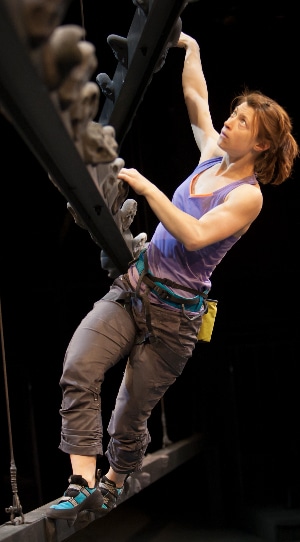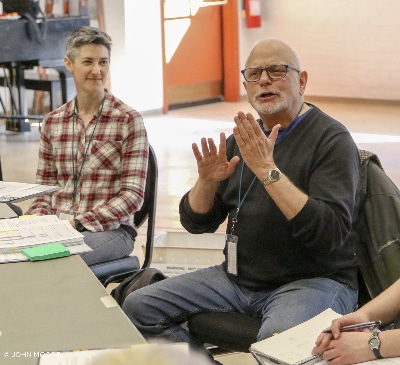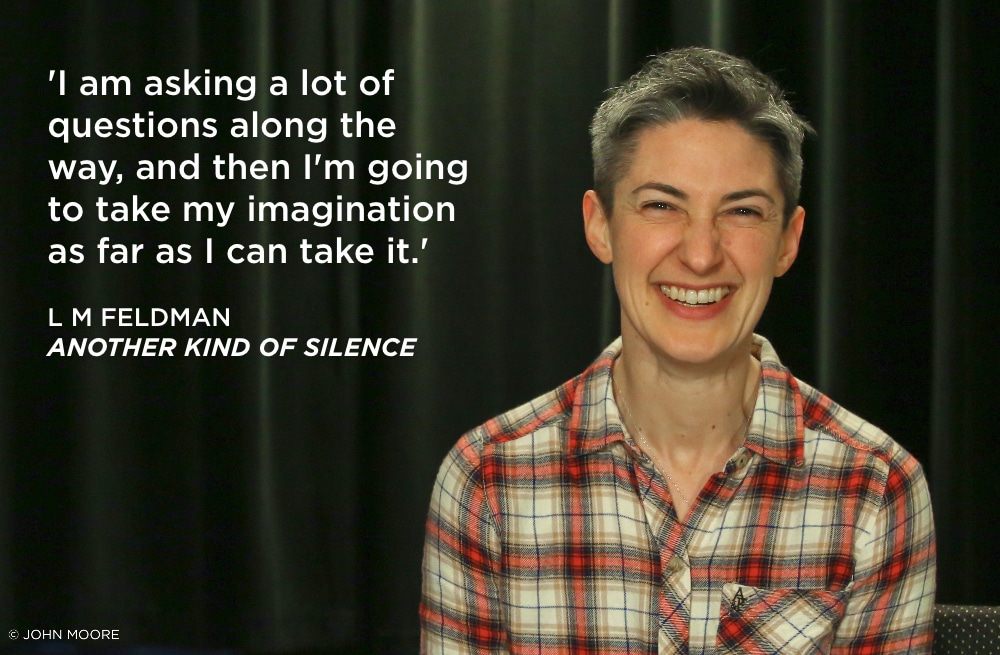DCPA NEWS CENTER
Enjoy the best stories and perspectives from the theatre world today.
Enjoy the best stories and perspectives from the theatre world today.
In this daily five-part series for the DCPA NewsCenter, we introduce you to the plays and playwrights featured at the Denver Center’s 2020 Colorado New Play Summit through February 23. Over the past 15 years, 31 Summit plays have gone on to be premiered as fully staged productions on the DCPA Theatre Company’s mainstage season. Today: L M Feldman, author of ‘Another Kind of Silence.’ She is joined by Lewis Merklin, Director of Artistic Sign Language, and Translator Natalie Austin, whose voice appears in the video above. Video by DCPA Video Producer David Lenk and Senior Arts Journalist John Moore.
The play in a nutshell: Balancing work, love and everything in between doesn’t come easily for two artistic couples living in Greece. Chap’s artwork lines the walls of her partner Ana’s café while Peter’s successful career as a composer overshadows his wife Evan’s struggle to write. When Evan and Chap spark an intimate friendship, the two couples and their four “shadow-souls” must confront the challenges of communication and the transformative nature of desire. Another Kind of Silence is a bilingual ensemble piece performed in English and American Sign Language. It was a finalist for the O’Neill National Playwrights Conference.
The playwright at a glance: L M Feldman is a queer feminist playwright, deviser, professor and circus performer who penned Grace, Or the Art of Climbing, which was featured at the 2012 Colorado New Play Summit and given a mainstage production by the DCPA Theatre Company the following year (under the author name Lauren Feldman). She loves theatre that is brave, physical, wildly theatrical, deeply intimate and slightly impossible. Her plays are ambitious and move and take up space. They also include Thrive, or What You Will; Amanuensis, or the Miltons; The Egg-Layers; and A People.
About the Director of Artistic Sign Language: Lewis Merklin is an an actor, playwright and a Certified Deaf Interpreter from a third-generation deaf family. He served as the Associate Director of Artistic Sign Language for Playwrights Horizons’ 2018 off-Broadway production of I Was Most Alive With You and is a staff interpreter with the New York City Department of Education. “I have a lot of experience and a real understanding of both the deaf world and the world of theatre at the same time,” he says.
Here are excerpted highlights from Senior Arts Journalist John Moore’s conversation with L M Feldman and Lewis Merklin, with assistance from Translator Natalie Austin:

Julie Jesneck as Emm in the DCPA Theatre Company’s 2013 production of ‘Grace, Or the Art of Climbing.’
John Moore: L, tell us about your last time here in Denver with Grace, Or the Art of Climbing.
L M Feldman: My play came to the Colorado New Play Summit in 2012, and that was fabulous. And then they decided to give it a full production the next season, which was really thrilling. And now I’m back with Another Kind of Silence.
John Moore: What was your motivating synapse for writing this new play?
L M Feldman: The first woman I ever fell in love with was hard of hearing, and there was something about learning from her about her experience that fascinated me. She was neither hearing nor deaf. She was raised aural, so she didn’t know any sign language. She had nothing in common, culturally or language-wise, with the deaf community, so she always felt like she was caught between these two worlds. And I was thrown for a loop because I was like, “Why am I attracted to a woman? This hasn’t happened to me before” – or I hadn’t let it happen to me before. There was something queer about where both of us were at in our lives. And so we launched on this collective self-discovery period of time, and that changed me.
John Moore: Introduce us to your play.
L M Feldman: There’s a woman named Evan who has been in a 10-year marriage with a man named Peter. Evan’s a writer. Peter’s a composer. While they’re in Greece for Peter’s work, Evan meets this woman named Chap, who’s a visual artist. The two of them have this very quick, intense, intimate, lovely friendship that develops very quickly into this “Oh, (bleep)!” moment when Evan realizes, “I could fall in love with this person.” Meanwhile, Chap is in a five-year, long-term partnership with a deaf woman named Ana, who’s a chef and runs the cafe. Everything that happens in play takes place between the meeting and the moment of decision.
John Moore: Lewis, what is a Director of Artistic Sign Language?
Lewis Merklin: It’s a little like a dramaturg, but it’s specifically related to deafness and sign language related to this specific play.
John Moore: And what is your job here?
Lewis Merklin: I’ve been helping L to make sure the story will really resonate with deaf culture and that the signing comes across successfully. Also, I watch the actors, and I make sure that their sign choices are clear. I also make sure that the audience is able to see all the actors who are signing. I want to be able to show the truth.
John Moore: Explain to us the central staging conceit of the chorus.

L M Feldman and Lewis Merklin. Photo by John Moore.
Lewis Merklin: Each of the four characters has its own individual chorus member.
L M Feldman: Yes, the characters are paired as a unit of two actors – they’re two parts of the same self.
Lewis Merklin: The chorus knows what’s happening internally with their characters – you can think of them as the Ego or the Id. They have direct communication with their characters. And sometimes the chorus members communicate with one another. And sometimes they communicate directly with other characters. It is very complex. But that allows us to include sign language and everyone speaking at the same time in the play. It’s a challenge, for sure.
L M Feldman: There are moments of full group synchronicity, and there are other moments when a character is just having a private conversation with themselves.
John Moore: And what most excites you about that as a theatrical device?
Lewis Merklin: Theatre allows you to experiment with different ways of communicating. And really, that’s what we’re looking at in this show: Human communication. It’s not just about deaf vs. hearing. It’s about interaction and connection with people – what works and what doesn’t.
John Moore: L, how would you describe the theatergoing experience?
L M Feldman: I’ve heard it compared to a musical, actually, even though there is no music.
‘L is not doing this without active input from the deaf community. She is really making sure that the deaf experience is honored.’ – Lewis Merklin
John Moore: Lewis, what does it mean to you and the deaf community when a playwright like L comes along and creates a story that includes fully fleshed deaf or hard-of-hearing characters?
Lewis Merklin: What I appreciate about L is that she is not doing this without active input from the deaf community. She is really making sure that the deaf experience is honored. She wrote what she knows. But she can’t know everything – and that can happen with any marginalized community. You need to be careful, and you need to make sure the information is accurate.
 John Moore: L, how important is the input that you’re getting from Lewis and the actors?
John Moore: L, how important is the input that you’re getting from Lewis and the actors?
L M Feldman: Vital. I feel extremely aware of being a hearing person writing this play, and so I am asking a lot of questions along the way. I want everyone to feel like I have skin in the game, and that I am searching for the vulnerabilities and the questions I can’t lay bare for myself. And then I’m going to take my imagination as far as I can take it.
John Moore: Lewis, when the reading is over, how do you want the hearing audience to have been changed?
Lewis Merklin: It’s important to know that this play is not about the deaf experience. We’re not teaching the audience what it means to be deaf. That’s been done. That’s old news. But while this play was not written for a deaf audience – it can be for both audiences. We’re just looking at four characters – some are hearing; some are deaf. They’re regular humans. They’re complicated, and complications come up in any relationship. We’re the same as anyone else.
L M Feldman: What’s central is the story, the characters, the relationships and the questions that the play is asking. My goal was to articulate those questions in really beautiful and complicated theatrical ways. Hopefully, that’s what’s ascendant, and that the story is being told in a way that mainstream hearing audiences haven’t seen before. Anything beyond that is gravy.
John Moore: And what are your first impressions of this year’s Colorado New Play Summit?
L M Feldman: I had several goals coming into this festival. One was to bring Chap’s storyline up to the level of Evan’s storyline in terms of sharing stage time, so that the play is really carrying both of their narratives equally. Another was figuring out how to really to flesh out Chap and Ana’s relationship. The third was how to make the best use of the chorus so that it doesn’t feel like they’re just an on-stage translation device – but instead they’re actually being integrated and utilized as human beings who have agency and opinions and disagreements so that the storytelling can feel richer.
John Moore: And you can’t do that alone on your computer.
L M Feldman: I definitely can’t do that alone on my computer. And I definitely can’t do that only in English.
John Moore was named one of the 12 most influential theatre critics in the U.S. by American Theatre Magazine. He has since taken a groundbreaking position as the Denver Center’s Senior Arts Journalist.
Check out all of our 2020 Colorado New Play Summit Spotlights:

Photos by John Moore.
Check out our growing gallery of photos from the 2020 Colorado New Play Summit
 Another Kind of Silence
Another Kind of SilenceCast and crew:
The 2020 Colorado New Play Summit is presented by AT&T, Sheri & Lee Archer/New Wave Enviro, The Joy S. Burns Commission in Women’s Playwriting, Daniel L. Ritchie, Semple Brown Design, Robert & Carole Slosky, and Transamerica.
Follow the DCPA on social media @DenverCenter and at the DCPA’s online NewsCenter.
